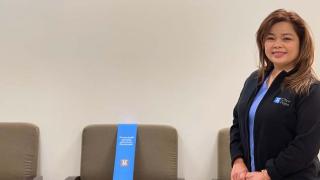Hugging a patient or holding their hand may seem like a small gesture, but it has tremendous meaning for many of the patients Vickie Dao meets. “Touch is part of how some of our elderly Asian and Pacific Islander (API) patients establish friendship,” said Dao, a medical assistant at City of Hope Huntington Beach.
Dao serves as a cultural envoy of sorts for the cancer organization’s API patients in the area, particularly those whose first language is Vietnamese. She is a friendly face in the front office and a reassuring translator for patients of medical oncologist and hematologist Danny Nguyen, M.D.
The API population is the fastest-growing in Orange County, so understanding Asian cultural nuances is key to addressing cancer care disparities that impact the entire region. City of Hope Orange County has made equitable access across the cancer care continuum a top priority, and employees like Dao make equity a reality for patients from the moment they walk through the door.
Vietnamese-speaking patients are grateful they can call a dedicated phone line that Dao will answer in their language, even outside regular office hours. “In the past, we had patients who couldn’t leave a message with the after-hours operator because of the language barrier,” Dao said. “Now, they can call me, and I will look up their chart to find the answer they need, or I will get in touch with the nurses or Dr. Nguyen.”
There are several cultural aspects that impact API patients, some of which are unique to specific communities, said Dao.
Dao serves as a cultural envoy of sorts for the cancer organization’s API patients in the area, particularly those whose first language is Vietnamese. She is a friendly face in the front office and a reassuring translator for patients of medical oncologist and hematologist Danny Nguyen, M.D.
The API population is the fastest-growing in Orange County, so understanding Asian cultural nuances is key to addressing cancer care disparities that impact the entire region. City of Hope Orange County has made equitable access across the cancer care continuum a top priority, and employees like Dao make equity a reality for patients from the moment they walk through the door.
Vietnamese-speaking patients are grateful they can call a dedicated phone line that Dao will answer in their language, even outside regular office hours. “In the past, we had patients who couldn’t leave a message with the after-hours operator because of the language barrier,” Dao said. “Now, they can call me, and I will look up their chart to find the answer they need, or I will get in touch with the nurses or Dr. Nguyen.”
There are several cultural aspects that impact API patients, some of which are unique to specific communities, said Dao.
- Language Differences “People feel secure and supported when they have someone from the same community who understands them and can address their concerns,” Dao said. “If patients are not comfortable with the language and they don’t get answers to their questions, they may walk away from care. Having someone speak the same language who can explain things to them shows them they matter, and it lifts them up and gives them hope.”
- Relationship-Building Dao said many API immigrants perceive physicians as authority figures, so she builds rapport to encourage patients to participate in their care. Patients may be reluctant to ask questions, because they do not want to appear as if they don’t understand, she said. “It’s important for the patient to feel validated and safe so they will be open with their doctor. By actively listening, I show patients they can trust us.”
- Socioeconomic Barriers Lower-income patients often have greater difficulty taking time off work or finding childcare or transportation to attend medical appointments in a distant location. “Having a network of four Orange County locations in Huntington Beach, Newport Beach, and Irvine reduces health disparities in underserved populations by bringing City of Hope’s highly specialized physicians and advanced cancer care close to home,” said Dao.
- Healing Traditions Western medical practices may be unfamiliar to people who have come here from API countries. Dao said modesty is emphasized in API cultures, which could be a barrier to women receiving care for health issues such as breast cancer. “Breast cancer is the most common cancer in Orange County,” said Dao. “My message to other API women is to love themselves, get annual breast cancer screenings, and talk to their doctor right away if they have concerns about their breast health,” Dao said.
Dao finds daily satisfaction in welcoming API patients to City of Hope Orange County. “I love my job because I know I am truly helping at-risk patients transcend barriers to advanced cancer care and receive the screenings, education, treatment, and support they need.”
Visit www.cityofhope.org/OC to learn more. To make an appointment at any of City of Hope’s four Orange County locations, click here or call:
- Newport Beach Fashion Island: (949) 763-2204
- Newport Beach Lido: (949) 999-1400
- Irvine Sand Canyon: (949) 333-7580
- Huntington Beach: (714) 252-9415
